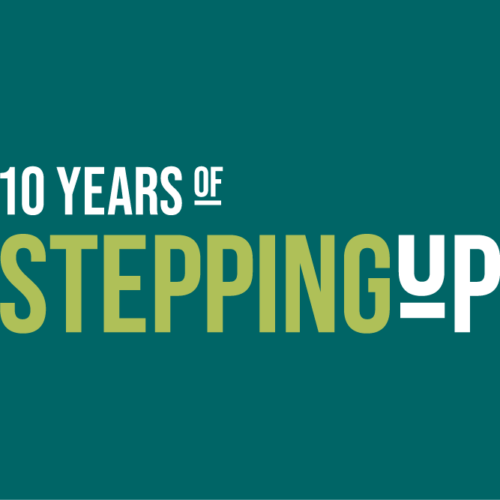
Looking Back at Five Years of a Federal Program Supporting County Justice Systems
The Justice and Mental Health Collaboration Program (JMHCP) supports communities across the country in their work to address overrepresentation of people with behavioral health needs in the criminal justice system. For five years, between 2015 and 2019, the U.S. Department of Justice’s Office of Justice Programs’ Bureau of Justice Assistance funded a JMHCP grant specifically geared toward supporting county justice systems in responding to people with serious mental illnesses (SMI) and co-occurring substance use disorders.
JMHCP Category 1: Collaborative County Approaches to Reducing the Prevalence of Individuals with Serious Mental Illnesses in Jails assisted grantees in developing systemwide, coordinated approaches to safely reduce this subset of the jail population. For many grantees, this funding helped them start or advance their efforts under Stepping Up, a national initiative addressing overincarceration of people with SMI in jails.
As grantees progressed through their Stepping Up efforts, many of them developed the capacity to collect accurate, accessible data on SMI in their jails. The Stepping Up initiative designates counties that can demonstrate this capability as “Innovators.” The initiative also encourages counties that have this data to participate in the Set, Measure, Achieve call to action, which challenges counties to set targets on one or more key measures of SMI prevalence in jails and track their progress over time.
JMHCP Category 1 by the Numbers
- 39 grants were awarded, amounting to a total of over $10 million
- 12 of the grantees went on to become Stepping Up Innovators
- 4 have signed on to Set, Measure Achieve
- 32 are featured in the Stepping Up Strategy Lab for innovative programs and practices
Takeaways for the Field
- Many of the most active and successful JMHCP Category 1 grantees leveraged grant funds to support a dedicated Stepping Up project coordinator, a position recommended by Stepping Up that works across system agencies to manage the planning process. The project coordinator facilitates meetings, assists with research and data analysis, and is in regular communication with planning team members.
- Sites that situated their Stepping Up planning committees within an existing coordinating body, such as a criminal justice coordinating council, were well-positioned to advance progress, given that the high-level decision-makers were already included in the committee.
- Buy-in from jail commanders or county sheriffs who operate jails was critical for implementing validated screening tools for SMI and co-occurring substance use disorders at the jail and tracking data.
- As sites honed their capacity to track and analyze data, they used data to inform their planning and decision-making and improve the response to people with SMI and co-occurring substance use disorders.
County Highlights
- Marion County/Indianapolis, Indiana, piloted a brief mental health screening for law enforcement officers to use in their encounters with community members and opened a drop-off center for people in crisis.
- Mental Health and Recovery Board of Union County, Ohio, embedded a mental health clinician at the county jail to provide services and connect people with SMI to treatment after release.
- Mental Health and Recovery Services Board of Lucas County, Ohio, leveraged grant funds to open a crisis drop-off center where law enforcement could take people experiencing a behavioral health crisis or community members could refer themselves.
- Pitt County, North Carolina, employed a jail navigator to serve people with SMI and ensure treatment connections upon release from jail.
- Region 1 Behavioral Health Authority in Nebraska conducted a Sequential Intercept Model mapping workshop and provided specialized training for law enforcement on working with people with SMI.
- San Luis Obispo County, California, implemented a validated screening tool for SMI at the jail and developed a strategic plan for its Set, Measure, Achieve efforts, setting targets across all four Stepping Up key measures.
- Screven County, Georgia, implemented a validated screening tool for SMI at the jail; employed a jail navigator; and leveraged telehealth services to connect people to treatment before and after release.
- Waukesha County, Wisconsin, launched a community-based crisis stabilization program for people leaving jail and returning to the community.
Learn more about JMHCP.
Photo by Chris F via Pexels.
About the author

The sharp rise in school shootings over the past 25 years has led school officials across the U.S.…
Read MoreA three-digit crisis line, 988, launched two years ago to supplement—not necessarily replace—911. Calling 988 simplifies access to…
Read MoreIt would hardly be controversial to expect an ambulance to arrive if someone called 911 for a physical…
Read More Taking the HEAT Out of Campus Crises: A Proactive Approach to College Safety
Taking the HEAT Out of Campus Crises: A Proactive Approach to College Safety
The sharp rise in school shootings over the past 25 years has led school officials across the U.S. to take a closer look at ways to keep students safe. For Chaffey College in Rancho Cucamonga, California, a tragic incident at a nearby university hit close to home and spurred campus leaders to revisit their own school’s threat assessments and crisis responses.
Read More From 911 to 988: Salt Lake City’s Innovative Dispatch Diversion Program Gives More Crisis Options
From 911 to 988: Salt Lake City’s Innovative Dispatch Diversion Program Gives More Crisis Options
A three-digit crisis line, 988, launched two years ago to supplement—not necessarily replace—911. Calling 988 simplifies access to services when people are seeking help for themselves or loved ones with suicidal thoughts, behavioral health concerns, or substance use-related crises.
Read More Matching Care to Need: 5 Facts on How to Improve Behavioral Health Crisis Response
Matching Care to Need: 5 Facts on How to Improve Behavioral Health Crisis Response
It would hardly be controversial to expect an ambulance to arrive if someone called 911 for a physical health emergency. And yet, for years, the default responders for a behavioral health emergency have been law enforcement officers, not behavioral health professionals.
Read More The 10-Year Impact—and Future—of Stepping Up: Facing the Behavioral Health Crisis in Jails and Communities with Real Solutions
The 10-Year Impact—and Future—of Stepping Up: Facing the Behavioral Health Crisis in Jails and Communities with Real Solutions
As the Stepping Up initiative marks its 10th year, America’s justice and behavioral health systems are facing a shared crisis: how to meet the behavioral health needs of people cycling through jails.
Read More A “Once in a Generation Opportunity” to Improve Reentry for Nearly 2 Million People
A “Once in a Generation Opportunity” to Improve Reentry for Nearly 2 Million People
19 states were recently granted permission by CMS to reimburse critical reentry services with Medicaid funding for up to 5 years.
Read More Local Criminal Justice System Innovations in Mental Health Services: Q&A with CSG Justice Center Advisory Board Member Dr. Doreen Williams
Local Criminal Justice System Innovations in Mental Health Services: Q&A with CSG Justice Center Advisory Board Member Dr. Doreen Williams
"It is the humane, person-centered approach that supports and stabilizes individuals, their families, and their communities."
Read More









